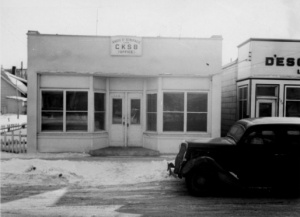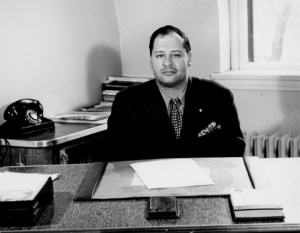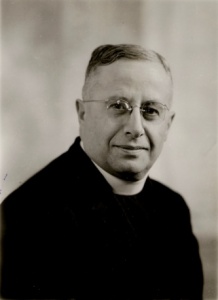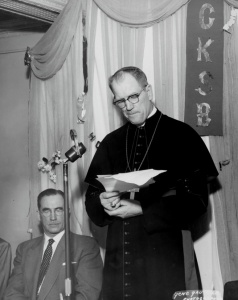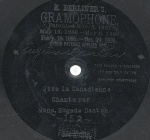Private French-language Radio in Manitoba
par Atangana-Abé, Jacob
Not enough attention has been paid to the struggle to develop French language radio in Manitoba and the resulting victory. Nevertheless, these efforts constitute an important and necessary step towards the preservation of French culture in Manitoba. French-language radio was an important milestone for the defence, development and affirmation of Franco-Manitoban identity. Thanks to initiatives such as this one, the French-speaking people of Manitoba were able to preserve their cultural and artistic heritage despite the daily overwhelming onslaught of English on radio.
Article disponible en français : Radio privée francophone du Manitoba
An Appeal for More French on the Airwaves
In the 1920's, the radio never attracted as much interest elsewhere in Canada as it did for the French-speakers of the Prairies. The geographically separated French-speaking communities couldn't get enough of it, particularly because it enabled them to strengthen cultural ties and their sense of belonging. Nevertheless, there was also much apprehension, because programs were broadcasts only in English. This meant that English programming was also a potential threat to French Canadian culture in the West. "Up to this point, the walls of homes had constituted a rampart against the encroachment of the English language, but Hertzian waves penetrated this last line of defence with ease.(NOTE 1)" This remark triggered a campaign of appeals for the increased use of the French language on radio programs of the time. The demands were based on the recommendation of the Aird Commission which, in 1929, suggested the nationalisation of radio broadcasting in Canada. The recommendations were never followed up, despite the creation of the Canadian Radio Broadcasting Commission (CRBC), which was in charge of implementing them. To rectify this injustice, in 1933, the Association d'Éducation des Canadiens-Français du Manitoba sent letters of protest to the commissioners of the CRBC, as a part of a conjoint initiative in collaboration with its sister associations in Alberta and Saskatchewan.
The appeal for the use of French had a remarkable impact on that period in history. French speakers in Manitoba obtained a half-hour broadcasting slot from the government-run CKY station, which enabled it to start running French-language programs beginning in April of 1933. In 1936, the new Prime Minister, Makenzie King, appointed Manitoban, Lucien Beaubien, as head of a committee to carry out an investigative survey of public broadcasting. This committee recommended the creation of the Canadian Broadcasting Corporation (CBC). The CBC, however, did not live up to the expectations of Western French speakers.
Disappointment with the CBC
The law that enabled the creation of the Canadian Broadcasting Corporation was passed on the 2nd of November, 1936. In his discourse instating the new changes intended to modernise the organisation, Gladstone Murray offered French speakers the following words of hope:
"First of all, what is important is to appease the general dissatisfaction in the regions where it is most severe and virtually always present. Radio can accomplish much towards establishing bilingualism all across Canada, so that, in the future, all Canadian citizens will be able to benefit from two cultures, two sources of literature and two perspectives, both English and French." (NOTE 2)
This impressive declaration expressed intentions that would never be acted upon. Furthermore, it confirmed the relevance of the Associations Nationales de l'Ouest (ANO) which had been established several months earlier. The associations were a kind discussion forum and included several French Canadian associations on the Prairies. Between 1936 and 1940, these associations clearly put forth the necessity of creating radio stations entirely managed by French speakers and specified that the French language programming on the CBC would need to have an equal share of air time with the English broadcasting. In response to this request-which was supported by several petitions-a 50,000-watt station in Watrous, Saskatchewan was established and given bilingual status. In practice, the statistics revealed that the station's bilingual status did not live up to expectations. For example, as of February 1939, only 6.5% of programming was broadcast to the French-speaking minority audience. In addition, "the program log from the week of the 3rd to the 9th of February, 1940 indicated only two hours of bilingual programming and not a single French program out of a total of 116 hours of programming on the national network (NOTE 3)."
Faced with a succession of broken promises, it was inevitable that the French-speaking community would come up with the idea of running a campaign to finance the construction of private radio stations in the three Prairie Provinces(NOTE 4). To put the plan in place, an organization representing the three Prairie Provinces was created: Radio-Ouest-Française (ROF) was created in order to be the voice of the French-language associations in the West and to negotiate on their behalf with various bodies of the Federal government, as well as with authorities in Quebec. In Quebec, their main partner would be the Comité Permanent de la Survivance Française en Amérique [Committee for the Survival of the French Language in North America] then overseen by president Adrien Pouliot, who was also a member of the Board of Governors of the CBC. Radio-Ouest-Française had a local committee in each of the three provinces. Manitoba's committee, coordinated by Father d'Eschambeault, was established in the fall of 1941.
From 1941 to 1944 a massive campaign was put into action, in order to raise an awareness among French Canadians on the Prairies concerning the establishment of four private French-language radio stations (one in Manitoba, one in Alberta and two in Saskatchewan). One of the climactic moments of this campaign was the creation of the official dogma of Radio-Ouest-Française. This document was intended incite French Canadians to demonstrate their generosity and sense of patriotism by supporting the organisation. The creation and distribution of this document had been preceded by a 1944 meeting with the CBC Board of Governors in Montebello. On this occasion, only one of the four broadcasting permits requested by ROF was granted: that of Radio-Saint-Boniface and it was grudgingly given out under the stipulation that the station would cost the CBC nothing to build, equip, operate and maintain(NOTE 5). The successful awarding of this permit was largely due to intense lobbying under the leadership of individuals such as Father Baudoux, Raymond Denis of Saskatchewan, Dr. Beauchemin of Alberta, Adrien Pouliot of the Comité Permanent (Quebec) and Archbishop Cabana and Father Antoine d'Eschambault of Manitoba. Father d'Eschambault collected sixty-three letters of support from people of all levels of society, regardless of the language they spoke.
After the affirmative decision handed down by the CBC Board of Governors, Radio-Saint-Boniface became a privately run company that was the property of the various French-speaking parishes in the province. The campaign to raise funding (from subscriptions) lasted two years (from 1944 to 1946) and brought in $130,000 ($85,000 came from Manitoba and $45,000 was raised by the campaign in Quebec and given to Manitoba). Because of the lack of steel due to the war, the construction and inauguration were postponed until 1946.
May 27th, 1946, the Glorious Day of Inauguration
The first French-language radio station in the West was inaugurated on the 27th of May, 1946. It was a memorable day for all French speakers in the West. It was on this day that all their hard work and dedication started a decade earlier was finally rewarded. However, now with CKSB on the air, there was another challenge: keeping the radio station alive and well on the airwave. CKSB's programming was rich and diverse and well-appreciated. Nevertheless, financing did cause a few worries for later managers. Eventually, they were obliged to run a second campaign to find new subscribers (1946-1947) and then a third had to be started in 1963. After expansion work was conducted in 1963, the station had used up its reserves of around $34,000, thereby undermining the strength of its financial position. At the time, its three main sources of income were donations, income from advertising and funds from sponsored foreign-language programs. The cash flow generated by these sources had begun to slow, but operating costs had continued to increase. The fact that, in 1961, the CBC had started renting programming slots for rerunning some of its programs didn't really do much to improve the situation. In 1968, the idea of selling the station began to circulate and so committee members engaged in initial talks with the CBC. An agreement was reached on March 31st, 1973 with the transfer of ownership to the CBC. Roland Trudeau, then president of CKSB, had this to say at the annual shareholders meeting that took place on December 5th, 1972: "In the last two years, even if we exclude equipment depreciation losses, we still have recorded losses of up to 9000 dollars. This is to say that the decision that you have made to sell the station was not taken lightly (...) like many of you, I approach this sale with regret, but we must be realistic."(NOTE 6)
The sale of Radio Saint-Boniface to the CBC turned a page in the history of the struggle of Manitoban French-speakers to preserve and affirm French-language culture in the West. However, this phase only constituted a single step along the way, for, during the early 1980's, young French speakers would come together at the Conseil Jeunesse Provincial (CJP) [Provincial Youth Council] to discuss the idea of creating a community, French-language radio station in Saint-Boniface. It finally went on the air in 1991, under the name Envol FM 91,1 (CKXL).
Private French-Language Radio in Manitoba Today
On the French-language broadcasting scene, there are now three radio stations: one state-run by Radio-Canada (CBC) and two private stations (Envol 91,1 FM (CKXL) and a university, student-managed station, CBAU from the Collège Universitaire de Saint-Boniface). Most of the programs are hosted by students and are destined for a mostly student audience. CBAU is financially supported by the University, as well as in terms of operating space and equipment.
As for the community station Envol, which went on the air in October of 1991, its programming has been increasing since 2001-2002. A study of its audience demographics(NOTE 7)-conducted within Manitoba's French-speaking community, between December, 2005 and March, 2006-revealed that the station had an average of 26,444 listeners on weekdays and 15,035 on weekends out of a possible 88,440 listeners residing in Winnipeg and the surrounding area(NOTE 8). Envol and CBAU sometimes work in partnership (e.g., for midday programming on weekdays). Thus, programming is aired from CBAU using Envol's broadcasting channel and the two stations are broadcasted over the internet using the University's bandwidth. Although CBAU benefits from its support from the University, Envol has no such financial support. Despite its relative prosperity, like many stations, it is faced with numerous challenges that threaten its operations. These challenges are related to financing, a generally lack of qualified employees and the rapid development of new technologies.
As it caters to a minority population in Manitoba, Envol has limited financing resources to work with. Because the French-speaking population is relatively small, potential advertising income is also limited. The same is true of the financing campaigns conducted in the community. The population is generous, but community members are often solicited by many other campaigns run by community organisations (e.g., Saint-Boniface General Hospital, Collège Universitaire de Saint-Boniface, Francofonds, etc.). As is the case in all sectors of French-langauge media in Manitoba, Envol is faced with a lack of qualified workers. Employee turnover is high, but the generous assistance of approximately fifty volunteers compensates for the lack of personnel. Finally, technology is evolving extremely fast in the media sector. It is changing an unmanageable pace for most community radio stations. To keep up with the times, Envol broadcasts on the Internet, but with a still limited capacity.
Conclusion
The history of French-language radio in Manitoba is full of challenges. At first, it was the rising to the challenge of ensuring the survival a minority language community, which was not only facing the threat that this new medium posed, but also was seeking to reap the associated potential benefits. Today, the challenge that faces private French-language radio in Manitoba is trying "do more with less" while keeping up with the times. In order to rise to these challenges, the French-speaking community has had to pool its resources and ingenuity and collaborate with other French speaking communities across Canada. Without a doubt, future generations will be called upon to renew this spirit of cooperation, in order to be able to face challenges ahead.
Jacob Atangana-Abé, Ph.D
Professor of Business and Institutional Management
Faculté des Arts et d'Administration des Affaires [Liberal Arts and Business Administration]
Collège Universitaire de Saint-Boniface
NOTES
Note 1. Lapointe, Richard et Lucille Tessier, Histoire des Franco-Canadiens de la Saskatchewan, Regina, Société historique de la Saskatchewan, 1986, p. 296.
Note 2. Vien, Rossel, Radio française dans l'Ouest, Montréal, Cahiers du Québec/Hurtubise HMH, 1977, pp. 24-25.
Note 3. Gareau, Laurier, Le défi de la Radio Française en Saskatchewan, Regina, Société historique de la Saskatchewan, 1990, p. 26
Note 4. D'Eschambeault, Antoine, « Radio Saint-Boniface, historique d'un mouvement », Chante-clair, mai 1946.
Note 5. Vien, op. cit. p.63.
Note 6. Archives de la Société historique de Saint-Boniface, Fonds Radio Saint-Boniface, 100/357/94.
Note 7. Consultation Annie Girard Consulting, «Étude sur l'auditoire actuel et potentiel d'Envol FM à Winnipeg et en périphérie», Saint-Boniface (Manitoba), Envol FM, mars 2006, 84 p.
Note 8. Statistics Canada, census 2001.
BIBLIOGRAPHY
Bocquel, Bernard, Au Pays de CKSB : 50 ans de radio française au Manitoba, Saint-Boniface (Manitoba), Les Éditions du Blé, 1996, 383 p.
Consultation Annie Girard Consulting, Étude sur l'auditoire actuel et potentiel d'Envol FM à Winnipeg et en périphérie, Saint-Boniface (Manitoba), Envol FM, mars 2006, 84 p.
D'Eschambeault, Antoine, «Radio Saint-Boniface, historique d'un mouvement», Chante-clair, mai 1946.
Gareau, Laurier, Le défi de la Radio Française en Saskatchewan, Regina, Société historique de la Saskatchewan, 1990, 226 p.
Lapointe, Richard et Lucille Tessier, Histoire des Franco-Canadiens de la Saskatchewan, Regina, Société historique de la Saskatchewan, 1986, p. 296.
Société historique de Saint-Boniface, Fonds Radio Saint-Boniface, 100/357/94.
Vien, Rossel, Radio française dans l'Ouest, Montréal, Cahiers du Québec/Hurtubise HMH, 1977, 194 p.

